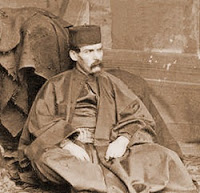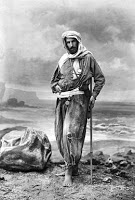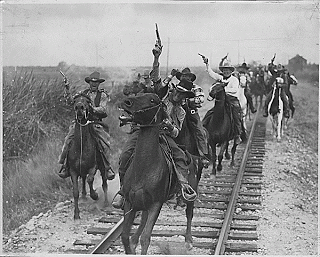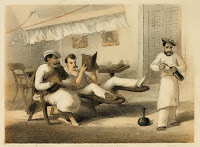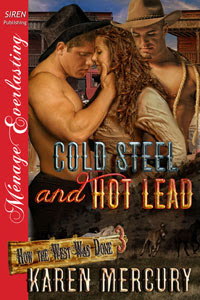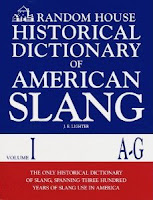Please welcome, once again, Karen Mercury to Tracy’s Place! Karen is here with us today with some enlightening and quite humorous information on…
Ye Olde &%$@! Talk
I adore slang—a big reason I’ve never written a historical novel set farther back in time than 1827. Writing medievals must be well-nigh next to impossible, with the restrictions put upon descriptions of various bawdy practices. I’ll venture a guess they had a wider vocabulary that never made it into the Oxford English Dictionary, but in historical writing, one must be entirely accurate and avoid anachronisms at all costs. I am constantly turning to my Random House Dictionary of American Slang, Volumes A-G and H-O (when the hell are they going to put out P-Z?).
There are limitations even in writing about 1827, a year that sounds fairly recent (to a historical novelist, anyway). A sucker in drag couldn’t boot anyone for being too breezy, a gun-shy peewee couldn’t cook a potato-head’s goose, a guy who wanted to put on the dog couldn’t pull the wool over anyone’s eyes, and an uppity no-count lunkhead couldn’t talk the hind leg off a donkey. Rummies drinking caper juice had to hit the road if they wanted to kick a lung out of any nances who were knee-high to a grasshopper, and god forbid if any geezers on a bust were to get worked up and yell blue murder while punching cows. It simply wasn’t done in 1827. Those poor bastards couldn’t even get the creeps, be tickled to death, or sass like a house on fire. Evidently everything was fairly proper in 1827.
And that’s not as much fun, is it? They couldn’t polish anyone off, put anyone out of action, or even experience puppy love until 1834. Yo! What in hell?
I felt very limited writing about 1827. Sure, they had funky, oiled duck-fuckers popping up when it rained cats and dogs, creating a rumpus and telling sons of bitches to kiss their ass. And I was lucky they could tell someone to cheese it (yes, as in Muggsy!), shake in their shoes, neck, pick someone off, or give a flying fuck (1800, when a fun-filled person, evidently lusting for life and liberty, distributed a flyer describing a sex act done on horseback). And one of the biggest losses to historical literature is that until 1870, no one could attend a “circus” featuring bestial couplings.

Writing historical sex scenes is even more limiting and frustrating. I suppose I love it because I love a challenge, and I play a sort of guessing game with myself. When a slang term pops into my head, I guess the decade it was first used, getting a nerdish thrill when I’m right. “Fucking” is a word with a grand old tradition dating back to at least 1687, when apparently a guy named Burford lamented his “Half ten Guineas spent in Wine and Fuck.” By 1785, these rebellious libertines were hard at it humping, but if you were to have a character saying “Let’s have coitus,” I’m sure the reader would picture Dr. Sheldon Cooper leering at them in his Flash superhero costume.
In the world of pre-Edwardian sex, a man could be possessed of a cock. That word goes back to a Middle-Aged gent who took his own quivering quill in hand and penned:
I have a gentle cock…his comb is of reed coral, his tail is of jet…and every night he perches him in mine lady’s chamber.
Or that’s my best interpretation, what with their Middle-Aged habit of randomly sticking the letter Y into every word. And pity the clueless 1618 adolescent who wondered, “Oh man, what art thou? When thy cock is up?” Our potent forefathers could have pricks, jocks, johnsons, bones, and a John Thomas if he was in Britain, but it wasn’t until 1888’s Stag Party (apparently a book containing “Socratic love,” a “French crisis,” and “a thousand other stories full of pith and point”) that someone thought to write:
Student (turning her fairly around and putting his dick where his finger was): Nice, isn’t it, ducky?
I am continually chagrined that in writing historicals I can’t use the word “dick.” My number one all-time favorite author Henry Miller gets into the game here (he is all over Random House, Volumes A-O), in 1934’s Tropic of Cancer writing, “It feels exactly as if he had taken out that dick of his and was peeing on us.” Thanks once again, Henry, for your descriptive prowess. I’ll stick with “penis.” I actually find that word elegant, attractive, and entirely unmedical, unlike:
Vagina. I just finished a wonderful Robin Schone novel where she uses that word a lot, but when reading it, I can only imagine myself with my feet up in stirrups, being prodded in a much more unpleasant and cringe-inducing manner. When it comes to describing women’s anatomy, a writer is even more limited thanks to the dreaded C-word, which still seems mostly unacceptable even in erotic romance due to its standing, and holding the number one place, as the most pejorative epithet one can call a woman. How fair is that, when it’s the mildest but equivalent thing to call a fellow a “dick”? For women we have twat (1656) which has a nice bawdy Earl of Rochester ring to it, quim (1613), and various other euphemisms invoking images of trains going through tunnels. And frankly, I like honeypot, simply because it sounds so damned cute.
For when you have possession got
Of Venus Mark, or Honeypot
These furious fornicators also had to invent verbs to describe the age-old practice of spanking the monkey. You’re pretty much stuck with “frig,” which sounds like something our lascivious ancestors made their wives do to their dirty pantaloons. Nobody was allowed to “jack off” until 1916, much less “beat off” (1962), probably a huge frustration to those who were stuck boxing the Jesuit and getting cockroaches, for which thanks must be given to that old standby for historical writers, Captain Grose of the 1811 Dictionary of the Vulgar Tongue. Grose states that is a “sea term for masturbation; a crime, it is said, much practised by the reverend fathers of that society.” I can’t be sure about “wanking off,” since Random House has not had the foresight to release Volume P-Z, but it sounds British, maybe 1950s. I am only guessing.

I wonder what these randy pioneers said when it came time to describe even more obscure acts, such as oral sex? Again, the authors of 19thC and earlier stories cannot feel free to utilize blowjob (1942), fellatio (1893), cunnilingus (1887), or cocksucker (1891). It’s a continuous search for acceptable terms that aren’t anachronistic, sound cute or sexy, and don’t make you feel like you work in an OBGYN office.
I have only barely dipped my wick into this rich pool of sexual terminology, and barely made a ripple, so please, if anyone can think of any historical terms possibly used by our founding fathers, in their fetid fervor for freedom, please let me know.
And in the meantime, if there are any questions about slang words P-Z…you’ll just have to ask the moth-eaten, flat-headed codgers currently growing cobwebs over at Random House.
Karen has been so generous and is offering up one e-copy of her new release Either Ore to one lucky winner.
They would form no brotherhood of virtue until driven to it by a brotherhood of vice.
1848 San Francisco. Lola Moreno has found a home at last, saved from destitution by businessman Gage Lassen. Gage is a withdrawn bachelor, and the most intimate subject he’s discussed with Lola is his preference in tea. Adventurer Harrison Bancroft arrives, fresh from years on the Plains living with Indians. Gage can only admit affection for another man, and things heat up when Harrison paints his portrait.
Harrison and Lola can find no way to allow Gage to participate in their love until Harrison unlocks the pain from Gage’s past, allowing him to emerge from his prison of cold restraint.
Corrupt enforcer Fowler threatens the trio with seeming knowledge of their private vices, harassing Harrison with his unwanted attentions, and a night of riots forces them to make a stand.
Three lovers, one destiny.
Just leave a comment on this post by 7:00pm (pacific) on Thursday, March 31st to enter. Winner will be announced on Friday, April 1


